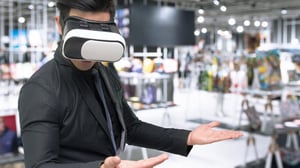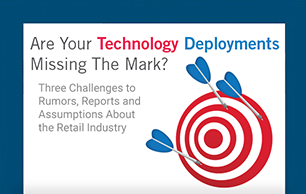 Interactive technologies abound in retail. From self-serve kiosks to digital signage and audio-visual, it’s no surprise to see many of these technologies in retail stores, quick serve restaurants and hospitality venues. However, those companies that truly leverage interactive to differentiate their business are fewer and farther between.
Interactive technologies abound in retail. From self-serve kiosks to digital signage and audio-visual, it’s no surprise to see many of these technologies in retail stores, quick serve restaurants and hospitality venues. However, those companies that truly leverage interactive to differentiate their business are fewer and farther between.
Technology implementations without the vision behind them make for lackluster use of these amazing technologies. The shining stars in retail are redefining shopping and customer experiences using these technologies and are seeing the benefit in the way of increased revenues, greater customer loyalty and competitive advantage.
Before planning your next interactive deployment, consider the vision behind your use of the technology. Here are some examples:
Provide an education
Apple has made their stores a destination for those who use and love Apple technologies. Customers are greeted at the door with iPad-wielding associates who can add customers’ names to the wait list, point them to the Genius bar, hand over a list of free classes or direct them to self-education apps in the store. They leverage interactive technologies and savvy associates to provide education on their products, increasing satisfaction with Apple products and unmatched in-store engagement.
Whether reviewing a tutorial on a tablet or viewing an educational video on digital signage or using technology to check wait times or sign up for an in-person class, retailers have an opportunity to leverage interactive technologies to create truly informative, educational content that keeps customers coming back for more.
Showcase product
Products tucked neatly on shelves or locked away in boxes do nothing to entice customers. And while it may not be possible to offer live interaction with every product, a great deal of information can be shared via interactive technologies.
Ikea uses virtual reality to transport its customers to new venues like their dream kitchen or living room, where they can open drawers, experience furniture and even cook in a virtual kitchen. Not only do customers leave the store with new ideas for furnishing their homes, but they also leave with a smile on their face and an unforgettable experience.
Give shoppers access
Interactive technologies empower customers to take charge of their own retail experience and to shop on their terms. CaliBurger uses self-serve kiosks with facial recognition to unlock a personalized interactive screen that displays past orders, loyalty program information and enables payment without a wallet. This not only makes it an extremely personalized experience for the customer, but also reduces average transaction time.
When used to deliver this kind of flexibility, self-serve kiosks can reduce friction and abandoned shopping carts.
These examples are just the tip of the iceberg when it comes to leveraging interactive technologies to optimize the customer experience. Start with your brand promise and what you hope to offer customers that no other business can and get creative from there. If you need help researching the possibilities, contact us to schedule a meeting with an expert from our Interactive Practice.




